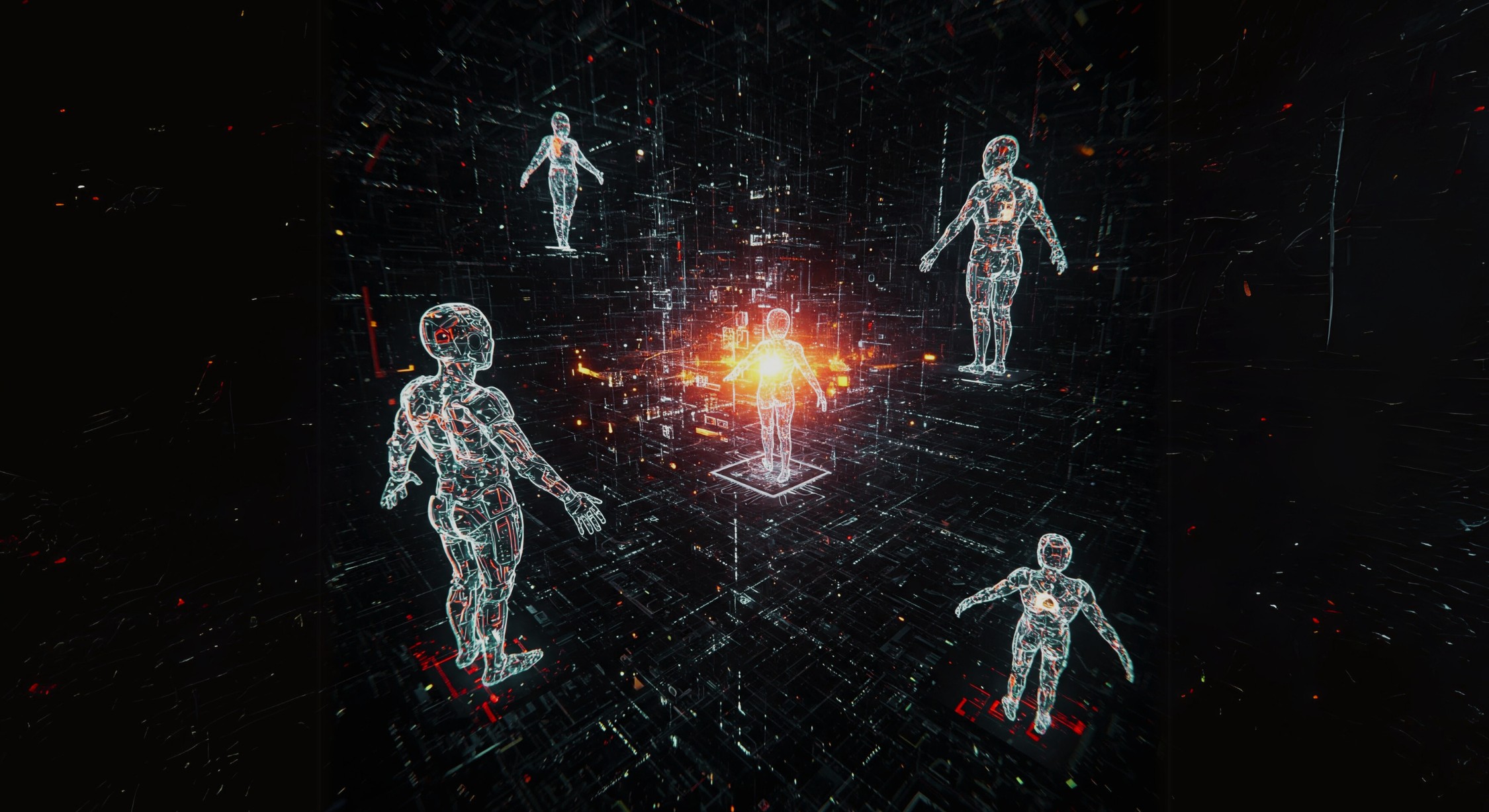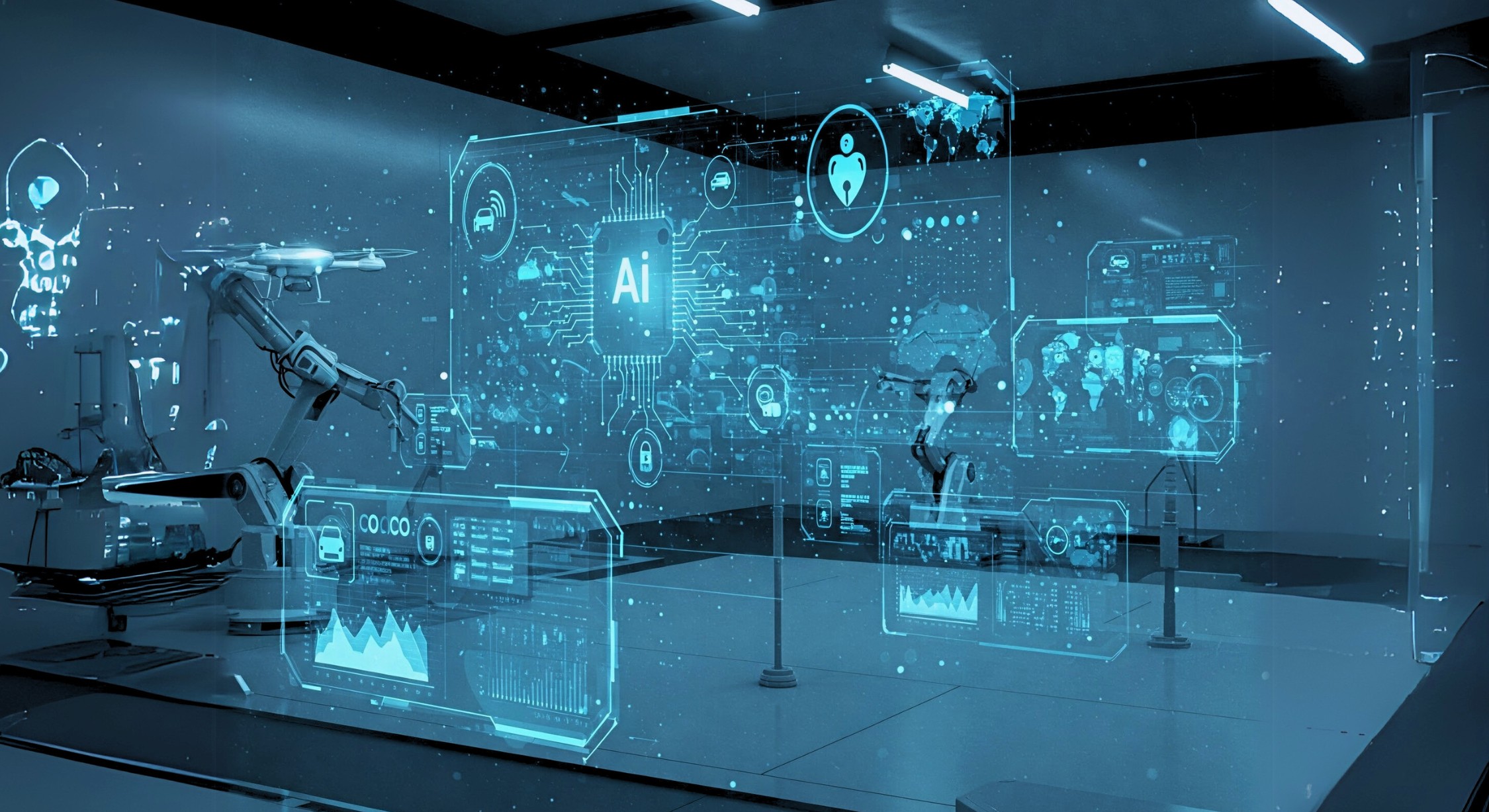At Experion Technologies, we specialize in transforming business operations through cutting-edge AI Agent Development, empowering enterprises to achieve automation, efficiency, and intelligence at unprecedented scale.
Artificial Intelligence (AI) has evolved from narrow machine learning models and rule-based systems into intelligent agent-based ecosystems that can perceive, decide, and act with autonomy. These AI agents are transforming how businesses operate, enabling faster decision-making, smarter automation, and better customer engagement across industries.
In today’s enterprise landscape, AI agents development is no longer just about automation; it’s about creating adaptive, collaborative systems that work seamlessly alongside humans to drive value.
What Are AI Agents?

At its core, an AI agent is a software entity that autonomously performs tasks, makes decisions, or solves problems by perceiving its environment, analyzing data, and executing actions, often without human intervention.
Unlike traditional bots or scripts, AI agents are built to handle dynamic and unpredictable scenarios, learning from experience and continuously improving their performance.
Core Capabilities of AI Agents
AI agents are not just tools that follow instructions; they are intelligent systems that combine perception, reasoning, and action to deliver business value. Their core capabilities form the foundation of their versatility and power in enterprise environments.
- Context Analysis:
AI agents are designed to interpret and make sense of a wide range of inputs. They can process text-based information such as emails, chat messages, or documents to understand intent, extract key insights, and determine sentiment. They can also analyze voice inputs by recognizing speech patterns, tone, and emotion, and interpret image and video data to detect objects, monitor environments, or identify anomalies. Furthermore, they handle structured data such as transactions, sensor readings, or logs to uncover trends, detect risks, and surface actionable insights. This ability to work across multiple data types makes AI agents highly adaptable to diverse industries and use cases. - Decision-Making:
AI agents are built to evaluate options and make evidence-based decisions. They can assess multiple variables simultaneously, such as cost, time, risk, and resource availability to determine the most effective course of action. Whether prioritizing tasks, resolving customer issues, or optimizing logistics, agents use sophisticated algorithms to weigh trade-offs and align their decisions with business objectives. Importantly, they are not static; they can adjust decisions dynamically as new data comes in, making them resilient in fast-changing environments. By incorporating predictive analytics, AI agents not only react to current conditions but also anticipate future needs and proactively recommend or initiate actions. - Task Automation:
In addition to analysis and decision-making, AI agents are highly effective at automating workflows across systems, departments, and touchpoints. They can trigger alerts, generate reports, update records, and execute transactions with precision and speed. For example, an AI agent can automatically process an insurance claim, notify a customer, update a CRM system, and escalate issues to human agents if needed, all without manual intervention. By handling both simple and complex workflows, AI agents help businesses reduce operational costs, improve accuracy, and free human teams to focus on higher-value work.
Modular Components of AI Agents
AI agents are often architected as modular systems, with specialized components that work together to deliver sophisticated capabilities. Understanding these components helps enterprises design agents that are tailored to specific needs.
- Execution Agent:
The Execution Agent is responsible for carrying out actions based on the decisions made by the AI system. This includes tasks such as sending notifications, updating records in enterprise databases, making API calls to other systems, processing transactions, or controlling hardware devices. It serves as the hands of the AI agent, ensuring that intended outcomes are reliably achieved in the real world. - Prioritization Agent:
This component focuses on determining the relative importance and urgency of tasks, requests, or events. The Prioritization Agent evaluates factors like deadlines, impact, risk, and customer expectations to rank tasks accordingly. For example, in a customer support center, it can escalate high-priority complaints, ensure service-level agreements (SLAs) are met, and allocate resources efficiently. By intelligently sorting and ranking activities, it helps businesses manage workload and optimize performance. - Task Agent:
The Task Agent is responsible for breaking down large or complex objectives into smaller, actionable subtasks. This modular approach improves efficiency and makes it easier to track progress, handle dependencies, and adapt to changes. For instance, in a manufacturing environment, a Task Agent can decompose a production order into individual steps—such as material preparation, assembly, and quality checks—and coordinate their execution across teams or machines. - Goal Agent:
The Goal Agent keeps the AI system aligned with broader business or operational objectives. It monitors outcomes, adjusts strategies, and ensures that the agent’s actions stay aligned with predefined goals. For example, in logistics, a Goal Agent might focus on minimizing delivery times while controlling costs, adapting routing strategies as conditions change. This component enables long-term optimization beyond short-term task execution. - Reflex Agent:
The Reflex Agent is designed for rapid, rule-based responses to specific triggers or events. It operates on predefined conditions and reacts without needing complex analysis or learning. Examples include instantly blocking suspicious transactions, sending alerts when critical thresholds are breached, or activating backup systems during outages. The Reflex Agent enhances system safety, security, and responsiveness in high-stakes environments.
When and Where to Use AI Agents
AI agents shine in scenarios where repetition, scale, and complexity intersect.
Ideal Use Cases
- Repetitive, rule-based tasks
- Multi-step workflows spanning departments or systems
- Real-time data analysis and rapid decision-making
- Personalized customer interactions
High-Value Domains for AI Agents
AI agents are reshaping industries by automating and optimizing critical workflows across a wide range of domains. Their adaptability, scalability, and intelligence make them indispensable in sectors where efficiency, precision, and real-time decision-making are crucial.
Predictive Analytics
AI agents leverage advanced algorithms to process raw data and generate context-rich, actionable intelligence. By continuously analyzing historical data, real-time streams, and external factors, predictive agents can forecast future outcomes, identify emerging trends, and detect anomalies.
- In healthcare, predictive agents forecast patient readmission risks or disease outbreaks.
- In finance, they anticipate market shifts, customer churn, or loan defaults.
- In manufacturing, they utilize predictive analytics to anticipate equipment failures, facilitating condition-based maintenance strategies.
These predictive insights enable businesses to make better decisions, reduce risks, and seize opportunities before competitors do.
Customer Service
Virtual agents are transforming customer experience by providing instant, 24/7 support across multiple channels, web, mobile, social media, and voice.
- They efficiently manage standard inquiries, resolve customer complaints, escalate intricate issues when necessary, and provide guidance throughout the transaction process.
- With sentiment analysis and personalization, they can tailor responses to each customer, improving satisfaction and loyalty.
This leads to reduced call center costs, faster resolution times, and improved customer retention.
ESG Compliance
As companies face growing pressure to meet environmental, social, and governance (ESG) requirements, AI agents play a critical role in:
- Monitoring carbon emissions, energy use, and supply chain sustainability
- Examining social indicators like workforce diversity and labor practices
- Ensuring compliance with regulations and producing transparent reports for stakeholders
By automating ESG tracking and reporting, agents help organizations reduce risk, build trust, and align with sustainability goals.
Fraud Detection
Reflex agents are highly effective at spotting and responding to fraudulent activities in real time.
- In financial services, they analyze transaction patterns, flag anomalies, and instantly block suspicious transactions.
- In e-commerce, they detect account takeovers, promo abuse, or fake reviews.
- In cybersecurity, they monitor network activity, identifying breaches or malware intrusions.
These agents enhance security by minimizing manual oversight while maintaining rapid incident response.
Logistics Optimization
Goal agents streamline the increasingly complex logistics landscape by optimizing routes, managing inventories, and improving delivery accuracy.
- They integrate data from traffic, weather, supply chains, and customer demands to make dynamic routing decisions.
- They automate warehouse operations, ensuring just-in-time inventory management.
- They balance cost, speed, and sustainability goals, helping businesses meet customer expectations while controlling expenses.
By automating logistical operations, goal agents reduce delays, optimize resource use, and boost overall operational efficiency.
Example Use Cases of AI Agents
To illustrate how these agents work in real-world settings, here are concrete examples across industries.
Reflex Agent: Instantly Blocks a Suspicious Payment Transaction
In banking, a Reflex Agent monitors millions of transactions in real time.
- When it detects unusual activity, such as a sudden large withdrawal or a foreign login attempt, it immediately freezes the transaction, alerts the customer, and notifies the fraud team.
- This fast, automated response prevents financial losses and protects customer accounts.
In cybersecurity, reflex agents trigger firewalls or access shutdowns when detecting intrusions, minimizing breach impact.
Goal Agent: Optimizes Delivery Routes Based on Traffic, Weather, and Cost Constraints
In logistics, a Goal Agent pulls data from GPS systems, weather services, and internal delivery systems.
- It adjusts delivery routes dynamically, balancing speed, fuel consumption, and delivery time windows.
- If a sudden traffic jam or storm emerges, the agent reroutes vehicles to minimize delays and costs.
Retailers and e-commerce companies benefit from goal agents that improve on-time delivery rates and reduce customer complaints.
Triaging Agent: Prioritizes IT Support Tickets for Critical System Issues
In IT service management, a Triaging Agent monitors incoming help desk tickets.
- It analyzes urgency, business impact, and affected users, automatically assigning top priority to critical system outages or high-profile clients.
- Low-priority tickets, such as password resets, are routed to self-service bots or junior support staff.
By intelligently triaging requests, the agent ensures rapid response to mission-critical incidents while improving overall support efficiency.
AI agents are transforming industries by combining automation, intelligence, and adaptability across predictive analytics, customer engagement, compliance, security, and logistics. Through carefully designed use cases such as reflex agents for fraud prevention, goal agents for supply chain optimization, and triaging agents for IT operations, businesses can streamline processes, improve outcomes, and deliver greater value to customers and stakeholders.
AI Agents Development: Core Concepts and Frameworks
The journey from simple automation to advanced AI agents development is marked by technological milestones.
From Rule-Based Systems to Autonomous Agents
Early automation relied on static rules and decision trees. Modern AI agents integrate machine learning, natural language processing (NLP), and reinforcement learning, enabling them to:
- Learn from experience
- Adapt to new data
- Optimize outcomes over time
Frameworks, Libraries, and Platforms
AI agent development uses a combination of:
- Frameworks: LangChain, Auto-GPT, BabyAGI
- Libraries: TensorFlow, PyTorch, Hugging Face, Scikit-learn
- Platforms: Azure AI, AWS SageMaker, Google Vertex AI
These tools allow developers to orchestrate workflows, integrate large language models (LLMs), and connect to enterprise systems.
The Shift to End-to-End Workflows
Modern AI agents no longer handle isolated tasks; they manage entire workflows, collaborating with other agents or systems to deliver end-to-end automation.
Example:
A customer support agent triages inquiries → routes to a domain expert → sends automated follow-ups → updates CRM records.
Integration with LLMs, Cloud APIs, RAG Systems, and Databases
- LLMs: Enhance natural language understanding and generation.
- Cloud APIs: Extend functionality with real-time data sources.
- Retrieval-Augmented Generation (RAG): Combine LLMs with structured knowledge bases.
- Enterprise Databases: Provide secure access to transactional and historical data.
Delivering Intelligence at Scale: AI Agent Development Services

For enterprises aiming to harness the full potential of AI agents, success hinges not just on the technology itself, but on selecting the right AI agent development services partner— one with expert knowledge, cutting-edge tools, and a strategic approach to deliver scalable, reliable, and transformative solutions that align with business objectives.
What Enterprises Should Look For
When evaluating a development partner for AI agents development, enterprises should focus on several critical capabilities that ensure a smooth journey from strategy to deployment.
Industry Expertise
Every industry has unique operational challenges, regulatory requirements, and domain-specific data. A development partner with deep industry experience can design agents that align with sector-specific needs, whether it’s healthcare compliance, financial risk management, or manufacturing optimization.
Full-Stack AI Capabilities (NLP, CV, ML)
AI agents often require the integration of multiple AI techniques:
- Natural Language Processing (NLP) for text and speech understanding
- Computer Vision (CV) for image and video interpretation
- Machine Learning (ML) for pattern recognition, prediction, and continuous improvement
A strong partner offers expertise across these areas and knows how to combine them effectively for enterprise applications.
Security, Compliance, and Governance Frameworks
As AI agents interact with sensitive data, enterprises must prioritize partners who understand:
-
- Data privacy laws and compliance requirements
- Robust cybersecurity practices
- Transparent governance models for AI decision-making
This ensures agents operate ethically, securely, and within legal frameworks.
Proven Track Record of Delivering Scalable Solutions
Enterprises should look for partners with a history of deploying AI solutions at scale, supported by case studies, references, and measurable outcomes. This indicates their ability to handle complex integrations, large datasets, and evolving enterprise needs.
Key Phases of AI Agents Development
Building enterprise-grade AI agents requires a structured, multi-phase development lifecycle. Each phase ensures alignment with business objectives and lays the groundwork for reliable, long-term success.
- Strategy and Data Consulting
This initial phase focuses on understanding the enterprise’s unique goals, challenges, and opportunities.
- Define the use cases and business value drivers for AI agents (e.g., cost reduction, speed, customer experience).
- Evaluate data accessibility, quality, and preparedness, pinpointing gaps or potential risks.
- Create a value roadmap that prioritizes initiatives based on impact, feasibility, and ROI.
A successful consulting phase ensures that development efforts are laser-focused on high-value outcomes.
- Design and System Architecture
In this phase, the development team designs a modular, scalable architecture that can support the AI agents’ lifecycle, from pilot projects to full-scale deployment.
- Define system requirements, agent roles, data pipelines, and integration points.
- Design flexible architectures that allow agents to communicate, collaborate, and evolve over time.
- Ensure the design supports enterprise scalability, with attention to failover, redundancy, and performance optimization.
Good architecture enables smooth interoperability between AI agents, legacy systems, cloud environments, and third-party platforms.
- Model Development (NLP, CV, ML)
Here, the team focuses on developing the core intelligence of the AI agents.
- Train custom models tailored to domain-specific tasks (e.g., medical imaging, legal document analysis).
- Fine-tune prebuilt models like GPT, BERT, or computer vision APIs for industry use cases.
- Implement continuous learning pipelines so agents can improve with time and feedback.
Model development is where the agents acquire the ability to perceive, reason, and act autonomously.
- Deployment and Orchestration
Finally, the AI agents are moved from the lab to live production environments.
- Implement the agents across workflows, systems, and channels.
- Establish orchestration layers to manage agent collaboration, task assignment, and conflict resolution.
- Deploy monitoring tools to track performance, user interactions, and business impact.
- Set up feedback loops for continuous retraining and optimization.
Deployment is not the end, but the start of a cycle of improvement where AI agents deliver increasing value over time.
Experion Technologies provides end-to-end AI Agent Development Services, combining deep domain expertise with advanced AI engineering to deliver solutions that scale across industries like finance, healthcare, logistics, and manufacturing.
Use Case Spotlight: AI Agents in Action

Predictive Claims Management (Insurance)
- Predictive Agent: Forecasts claim risk.
- Triaging Agent: Assigns cases by complexity and urgency.
- Claim Processing Agent: Automates document review and approval.
Conversational Tech Debt Assistant (Automotive)
- SQL Agent: Queries legacy databases.
- RAG Agent: Provides contextual insights.
- Chart Agent: Visualizes trends and patterns.
All integrated via Microsoft Teams, enabling seamless collaboration.
AI for Quality Engineering (Embedded Systems)
- UT Gen Agent: Auto-generates unit tests.
- Doc AI Agent: Extracts insights from technical documentation.
AI for ESG Compliance & Hardship Management (Finance)
- Detects risk patterns
- Analyzes customer sentiment
- Delivers personalized outreach and solutions
Challenges and Considerations in AI Agent Development
While AI agents offer enormous potential for automation, optimization, and innovation, enterprises must navigate several challenges to ensure responsible and effective deployment.
- Balancing Autonomy with Compliance and Risk
With increasing autonomy, AI agents are required to operate within a framework of legal, ethical, and organizational constraints, presenting significant governance challenges.
- Regulatory Frameworks: AI agents deployed in sectors like healthcare, finance, and insurance must comply with strict regulations (e.g., HIPAA, GDPR, SOX). Failing to do so can lead to fines, reputational damage, or loss of customer trust.
- Guardrails and Oversight: Enterprises must define clear operational boundaries and set thresholds where human intervention is required. For example, a claims processing agent may handle low-value, routine cases autonomously but escalate high-value or suspicious claims to human supervisors.
- Example: In a banking environment, a loan approval agent must adhere to credit regulations and fairness principles, avoiding bias or discrimination in decision-making.
- Data Governance and Privacy
AI agents process extensive datasets that frequently include sensitive information, making robust data security essential.
- Responsible Data Management: Organizations must ensure that AI agents access, process, and store data securely. This includes compliance with data protection laws and internal governance policies.
- Encryption and Access Controls: Data transmitted between agents, systems, and databases should be encrypted both in transit and at rest. With role-based access in place, your sensitive data stays secure—only approved users and AI agents can view or make changes.
- Audit Trails: Detailed logs must track every action and decision taken by AI agents, enabling traceability and accountability for audits, investigations, or error resolution.
- Example: A healthcare chatbot assisting patients must protect personal health data under HIPAA guidelines, using secure communication and strict access permissions.
- Continuous Retraining and Feedback Loops
AI agents operate in dynamic environments where data, regulations, and business needs change constantly.
- Maintaining Accuracy: Without regular updates, AI models can degrade in performance, leading to biased decisions or outdated recommendations.
- Active Learning: AI agents should be integrated with systems that provide real-time feedback, error signals, and user corrections, allowing them to retrain and adapt on the fly.
- Monitoring Systems: Enterprises should use AI observability platforms to track agent performance, detect drift, and trigger retraining when needed.
- Example: A predictive maintenance agent in manufacturing must continually update its models as new equipment is introduced or as operational patterns shift.
- Managing Agent Collaboration at Scale
Deploying one or two agents is manageable, but coordinating dozens or hundreds of agents across departments, processes, or geographies creates new complexities.
- Orchestration and Coordination: Enterprises must implement orchestration layers that manage task assignment, prevent conflicts, and ensure smooth handoffs between agents and humans.
- Avoiding Redundancy: Without careful design, multiple agents may duplicate efforts or work at cross-purposes, reducing efficiency or creating confusion.
- Example: In a smart factory, task agents may handle equipment monitoring, while goal agents optimize production schedules. An orchestration layer ensures they work together rather than interfering with each other.
Future Trends in AI Agent Development

The future of AI agent development is accelerating rapidly, bringing innovations that will redefine industries and reshape enterprise operations.
Human-Like Multi-Agent Systems
Next-generation agents will move beyond task execution to reasoning, negotiation, and collaborative decision-making.
- Agents will debate priorities, resolve conflicts, and coordinate joint tasks without human oversight.
- In customer service, multiple agents may coordinate to provide seamless, multi-channel support for complex cases.
This human-like teamwork will increase system resilience and flexibility.
Fusion of Generative AI and Agentic Systems
Combining generative AI (text, image, and code creation) with agentic frameworks unlocks hyper-automation and creativity.
- Generative agents can draft proposals, generate reports, design products, or write code on demand.
- Agents will not only execute tasks but create new knowledge, content, and solutions.
Example: In marketing, generative agents could create campaign copy, design visuals, and optimize performance in real time.
AI in the Metaverse, Robotics, and Virtual Operations
AI agents will increasingly power immersive and physical experiences.
- Agents in the metaverse will function as virtual support, offering guidance and companionship.
- In robotics, they will control physical devices—whether cleaning robots, delivery drones, or surgical machines.
- In digital twins, agents will simulate and optimize operations across virtual representations of factories, supply chains, or cities.
This convergence of virtual and physical systems will transform industries from retail to healthcare to manufacturing.
Vision of Fully Autonomous Enterprises
The ultimate ambition is an enterprise where autonomous agents handle end-to-end operations with minimal human intervention.
- Sales agents negotiate deals and onboard clients.
- Supply chain agents coordinate procurement, manufacturing, and delivery.
- Finance agents manage payments, compliance, and reporting.
While still aspirational, the rise of such enterprises will reshape competition, efficiency, and business models across industries.
How Experion Can Offer Support in AI Agent Development
Experion’s AI Agent Development services have delivered proven results, including a 30% faster claims processing rate and 20% cost savings for clients in the insurance sector.
We help enterprises:
- Identify high-impact use cases
- Design and build modular AI agent systems
- Integrate AI agents into existing digital ecosystems
- Provide ongoing optimization, monitoring, and governance
With Experion, you gain a trusted partner who can translate cutting-edge AI into meaningful business outcomes.
Conclusion
AI agents are more than just bots, they’re intelligent, autonomous collaborators that redefine how work gets done. With the right AI agents development services and a sound strategy, enterprises can achieve radical transformation, unlocking new levels of efficiency, accuracy, and innovation.
Key Takeaways
- AI Agent Development enables autonomous systems that analyze, decide, and act in complex environments.
- Core capabilities include context analysis, decision-making, and task automation.
- Key components such as Execution Agents, Prioritization Agents, and Task Agents power sophisticated workflows.
- AI agents excel in predictive analytics, customer service, ESG compliance, and logistics optimization.
- Success depends on balancing autonomy with risk, ensuring data governance, and managing continuous improvement.
- Future trends include human-like multi-agent systems, generative AI fusion, and autonomous enterprises.
Experion Technologies offers end-to-end AI Agent Development Services, helping businesses design, build, and scale intelligent agents that deliver measurable impact.

